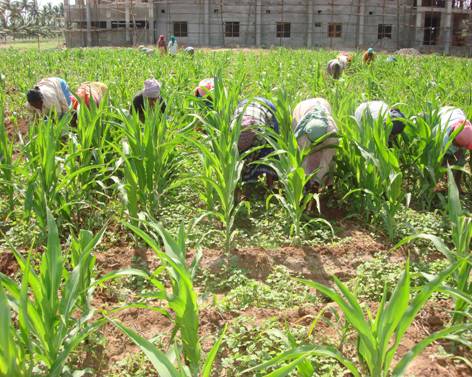Subsistence and semi commercial farming in the areas of Zhomba, Magehe and Simchembo have been traditional labour employers for the people of Nenyunka, Siabuwa, Siakobvu in Gokwe North and other surrounding areas.
The mechanisation which have come with technology has seen most of the manual work which required these people being scrapped out or reduced such that these communities are now starving.
During the weeding period these people came down to fend for their families and they obtained grains and money in return which would take them and their families for a year. Some used to relocate as migrant labour and they could stay until the harvest time while sending food back home.

Due to mechanisation most farmers have resorted to the use of herbicides in place of weeding or hoeing there by killing one of the major income earner for these communities.
Speaking to My Gokwe Media, one prominent farmer Mabhongwani agreed that mechanisation was severely killing the communities.
“It’s true, mechanisation is reducing labour consumption in today’s farming practices. We used to be employing hundreds of people from top of the mountain (vekuseri kwegomo) to do the weeding but now we have resorted to spraying using herbicides,” said Mabhongwani.
It is however not making sense to My Gokwe Media for the farmers to use herbicides which seemed expensive, going for about $12 at Chitekete Growth Point and around $8 at GoKwe Centre instead of that cheap labour from the “kuseri Kwegomo Communities”.
Mrs Tshuma of Magehe community argued that, ““These cheap labourers bring at least three to five children each. These children they are just a burden in terms of food, blankets and water yet they are too young to provide labour. So in that way herbicides are better”.
Adding to that, Ngwenya of Zhomba Community chipped in and highlighted that, “herbicides are expensive but effective. These people just remove half of the weeds and the other half is left covered under soil and after 2 days one cannot distinguish between the cleared area and areas yet to be worked”.
Evidently, finding labour work in Zhomba farming communities proved to be a golden prize as many people from Siakobvu areas are now spending much of their time moving from one place to the next without securing any work.
One exhausted migrant labourer from Siakobvu complained that it’s now a week and she had been moving looking for employment but cannot get one even from those trusted employers who used to hire her.
“I left my family starving, I brought my husband and some elder kids, we have been moving hunting for employment but to no avail, we are really going to die if no food aid is given to us”, said Mrs Kadjwe.
Given the trending use of modern day farming techniques, the government and other humanitarian organisations should consider extending food aid to these communities.
Their communities are animal endangered and they cannot harvest anything even if they try to do their farming. Adding to that, the soil type in these areas is not fertile, hence no proper farming can be done except being labourers to the communities whose labour uptake is declining each year.











